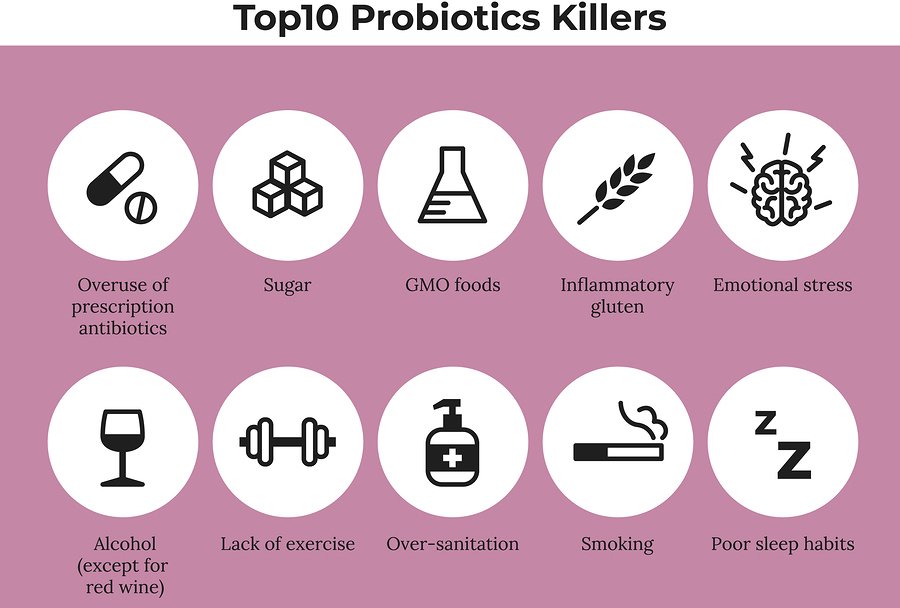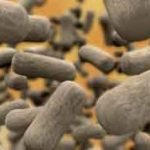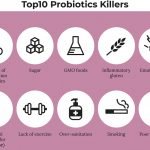Unfortunately, the levels of beneficial bacteria decline dramatically as the human body ages. Some of the reasons for this decline include:
- Over time, the colonies of friendly bacteria just naturally age and lose their vitality.
- Disruptions and changes in the acid/alkaline balance of the bowels can play a major role in reducing the growth of beneficial bacteria. In addition, these changes tend to favor the growth of harmful viral and fungal organisms as well as putrefactive, disease-causing bacteria.
- Non-steroidal anti-inflammatory drugs (NSAIDS) like Advil, Motrin, Midol, etc. are destructive to intestinal flora.
- Chlorine in the drinking water not only serves to kill bacteria in the water; it is equally devastating to the colonies of beneficial bacteria living in the intestines.
- Radiation and chemotherapy are devastating to your inner bacterial environment.
- Virtually all meat and chicken and dairy that you eat (other than organic) is loaded with antibiotics, which destroy ALL of the beneficial bacteria in your gastrointestinal tract.
- A diet high in meats and fats, because they take so long to break down in the human body, promotes the growth of the harmful, putrefying bacteria.
- Constipation, of course, allows harmful bacteria to hang around longer, which allows them to proliferate.
- Cigarettes, alcohol, and stress are also major culprits — as are some antibiotic herbs, such as goldenseal (if taken in sufficient quantity).
- And if you’ve ever been subjected to a round of “medicinal” antibiotics, you can kiss your beneficial bacteria good-bye. The problem is that antibiotics indiscriminately destroy both bad and GOOD bacteria — allowing virulent, mutant strains of harmful microorganisms to emerge and run rampant inside the body. Antibiotics (both medicinal and in our food supply) are the #1 culprit in the overgrowth of HARMFUL pathogens in the gastrointestinal tract (a condition called dysbiosis) that may be at the root of many autoimmune disorders and certain cancers.
The Bottom Line to Strengthen Your Immune System
A properly functioning intestinal tract is one of your body’s first lines of defense against invaders and a healthy immune system. In a healthy colon there are, on average, anywhere from 100 billion to 1,000 billion beneficial bacteria per milliliter (about 1/5 of a teaspoon) that literally consume harmful bacteria and other invaders. In the typical American, because of poor diet and neglect of the colon, the beneficial bacteria count may be as low as 4 or 5 per milliliter. Just compare 1,000 billion to 4, and you’ll have an understanding of the scope of the problem. Many researchers now believe that declining levels of friendly bacteria in the intestinal tract may actually mark the onset of chronic degenerative disease and a suppressed immune system. Our goal is to strengthen the immune system.
The Benefits of a Healthy Intestinal Tract
The benefits of a probiotically optimized intestinal tract include:
- Lowered cholesterol
- Inhibition of cancer
- Protection against food poisoning
- Protection against stomach ulcers
- Protection against lactose intolerance and casein intolerance
- Enhanced immunity
- Protection against many harmful bacteria, viruses, and fungi
- Protection against candida overgrowth and vaginal yeast infections
- Prevention and correction of constipation and diarrhea, ileitis and colitis, irritable bowel syndrome, and a whole range of other digestive tract dysfunctions
- Improvement in the health and appearance of the skin
- Better nutrition from improved absorption and the internal generation of B vitamins.
- Protection against vaginosis and yeast infections
A Key to Good Health: Probiotics
There can be no true health or recovery from disease unless you have colonies of over 100 trillion beneficial microorganisms flourishing in your intestinal tract, from your mouth to your anus, aiding in digestion, absorption, the production of significant amounts of vitamins and enzymes, and working to crowd out all harmful bacteria — allowing them no place to gain a foothold. SUPPLEMENTATION WITH A GOOD PROBIOTIC IS MANDATORY TO RAISE YOUR BASELINE OF HEALTH AND STRENGTHEN YOUR IMMUNE SYSTEM.
Probiotic Benefits: The Best Formulas
A good probiotic formula is absolutely essential for long-term intestinal health, and long-term parasite control. When choosing a probiotic, look for the following characteristics:
- Not all strains of beneficial bacteria are created equal. For each type of bacteria, there are recognized super strains. Choose a formula that uses only recognized super strains of beneficial bacteria — clearly identified as such on the label or in the company literature.
- Make sure the probiotic formula you choose includes the all-important supernatant — the medium the culture was grown in. The supernatant, contains a multitude of beneficial byproducts of the growth process, including: vitamins, enzymes, antioxidants, and immune boosters.
- Then there’s the question of how many live microorganisms are left in your formula when you actually use it. Pick up any probiotic formula, look at the label, and you’ll see something like: “Contains 13 billion live organisms per capsule at time of manufacture.” And that’s the problem: “at time of manufacture.”
The die-off rate for probiotics can be astounding. Most formulas will experience a die-off approaching log 3 within just 60 days of manufacture. That means that the 13 billion you see on the label may be down to 13 million, or less, by the time you use it. Heat and moisture accelerate the process, which is why most manufacturers recommend keeping your probiotic supply refrigerated.
There are many beneficial bacteria that can be contained in a good probiotic, but two are preeminent. To maximize the probiotic benefits, look for a formula based on these two:
- L. acidophilus resides primarily in the small intestine and produces a number of powerful antimicrobial compounds in the gut (including: acidolin, acidolphilin, lactocidin, and bacteriocin). These compounds can inhibit the growth and toxin producing capabilities of some 23 known disease-causing pathogens (including: campylobacter, listeria, and staphylococci), as well as reduce tumor growth and effectively neutralize or inhibit carcinogenic substances.
It’s also important to note that L. acidophilus is the primary beneficia bacteria in the vaginal tract. When the presence of the acidophilus is compromised, this allows the bad guys such as Gardnerella vaginalis or E. coli or Chlamydia to take over.
- Many researchers believe that declining levels of bifidobacteria in the large intestine actually mark the eventual onset of chronic degenerative disease. Bifidobacteria benefit the body in a number of ways. They consume old fecal matter, have the ability to remove cancer-forming elements (or the enzymes which lead to their formation), and protect against the formation of liver, colon, and mammary gland tumors.
More is not always better. Too many beneficial bacteria in one formula may find the bacteria competing with each other before they can establish themselves in separate areas of the intestinal tract. On the other hand, there are several other bacteria that are extremely beneficial in any probiotic formula.
- L salivarius helps digest foods for a healthy intestinal tract and makes vital nutrients more assimilable. It also works to eat away encrusted fecal matter throughout the entire colon; it helps repair the intestinal tract by providing needed enzymes and essential nutrients; and it adheres to the intestinal wall, thereby forming a living matrix that helps protect the mucosal lining.
- L. rhamnosus is powerful for immune system support. It can increase the natural killing activity of spleen cells, which may help to prevent tumor formation. It boosts the ability of the body to destroy foreign invaders and other harmful matter by three times normal activity; and has been shown to increase circulating antibody levels by six to eight times.
- L. plantarum has the ability to eliminate thousands of species of pathogenic bacteria. It also as extremely high adherence potential for epithelial tissue and seems to favor colonizing the same areas of the intestinal tract that E. coli prefers — in effect, serving to crowd E. coli out of the body. At one time, plantarum was a major part of our diets (found in sourdough bread, sauerkraut, etc.), but is now virtually nowhere to be found.
- Note: a good probiotic formulation will usually contain fructooligosaccharides (FOS) which help promote the growth of beneficial bacteria. For some friendly bacteria, such as the Bifidus, FOS can increase their effectiveness by a factor of 1,000 times or more!!
Guidelines For Taking Probiotics
One final note: start slowly. When you first start using a probiotic supplement, there is a chance that you will precipitate a die-off of bad bacteria in your intestinal tract. This can lead to gas, stomach rumblings, and cramping for up to three weeks.
Still interested in more information on probiotic benefits? Review the following Newsletters:












Effective Probiotics in intestine
What type of Probiotic is good for the intestine? Does yogurt stay in the stomach or goes through the intestine? What do Probiotic juice drinks do for your system?? Which are good verses bad?
My wife had 6 inches of her intestine taken out because of scar tissue blockage. She started to take probiotics but she is not clear on which is good for her intestine. She feels that PB8 and mango juice and probiotic yogurt is not helping. What can you recommend?
Thank you
i was reading about your
i was reading about your PROBIOTICS MIRECLE. I was trying to find ingridients nd couldn’t. Please, can you send me an ingridients if your PROBIOTIC MIRICLE. Thabk you. Lilia
Jon Barron recommends to be
Jon Barron recommends to be selective in the type of probiotic you use, as indicated in his criteria above for a quality supplement. Or, you can see what he recommends in our “Products” page above. Just scroll through the list and see the companies on the right that make the formulas.
In a healthy colon there are,
In a healthy colon there are, on average, anywhere from 100 billion to 1,000 billion beneficial bacteria per milliliter (about 1/5 of a teaspoon) that literally consume harmful bacteria and other invaders. In the typical American, because of poor diet and neglect of the colon, the beneficial bacteria count may be as low as 4 or 5 per milliliter. Just compare 1,000 billion to 4, and you’ll have an understanding of the scope of the problem
How did Jon come up with typical American can have aslow as 4 or 5 good bacteria per millimeter??? There’s no way he’s just guessing. I’m assuming he’s basing that 4 or 5 on people’s gut microbiome tests??
Also when Jon says we have total 400 species of good bacteria?? I’ve heard many sites say we have thousands strains good bacteria.
Which gut microbiome tests are accurate according to Jon to find out levels of good vs bad bacteria?? Since 85% of immune system is the 100trillion good bacteria
Jon says probiotic supplement mandatory
So sauerkraut is not good enough to recolonize 100trillion bacteria is gut to rebuild 85% immune system in gut??
Mercola.com interview with Natasha Campbell she tested sauerkraut andper bite it has 10 trillion good bacteria!! Per bite
And lacto bacillus in sauerkraut secretes massive amounts enzymes. She also says only take teaspoon day sauerkraut if never taken due to die of effect…teaspoon every 3 to 4. Days
So sauerkraut 10trillion good bacteria per bite! According Jon shouldn’ sauerkraut bebeyond good enough to recolonize gut to100 trillion in weeks or few months with just one bite sauerkraut every few days???
If so is ubiome or viome good gut microbiome tests??
What does Jon think about taking
SACHHAROMYCES BOULARDII 250mgfor 4 weeks to rebuild GLYCOCALYX lines gut otherwise probiotics will NOT stick and colonize to gut??
Dr schulze superfoods has SACHHAROMYCES in it
Thanks
It sounds like you may be
It sounds like you may be confusing the number of bacteria with the types of strains. Jon states, “When you are healthy, over 100 trillion microorganisms, from some 400 different species, flourish in your intestinal tract…” As for sauerkraut, experts suggest that if it is properly prepared, only four main species of lactic acid bacteria are present in sauerkraut: Leuconostoc mesenteroides, Lactobacillus brevis, Pediococcus pentosaceus and Lactobacillus plantarum. When you take a well-balanced probiotic, you are getting other important strains too. Here are some of the ingredients to look for:
Hope that helps!
These your information
These your information articles are excellent and inspirational.
Thank you so much
I’m so thankful for featuring
I’m so thankful for featuring this article because my problem is on my digestive system. This would help me remedy my problem. More power to your site. God bless.
is the probiotic formula gm
is the probiotic formula gm free?
We don’t sell any products
We don’t sell any products here at the Baseline of Health Foundation. If you have questions about this formula, it can be found at Baseline Nutritionals. Their customer support team is a great resource for any product questions. That said, they do not use genetically engineered strains in their probiotics formula.
Are there any good probiotics
Are there any good probiotics that do not need to be refrigerated?
I was on 10 weeks of strong anti-biotics a year ago to kill the giardia, amoeba and other bacteria I had picked up while snorkeling in what turned out to be polluted ocean water and that caused extreme diahhrea. My immune system and digestive systems are still shot. I do have celiac sprue so that maybe part of the problem. I have had diahhrea for over a year now and the Dr.’s here and in FL have not been able to clear it. I live in Panama and have not found any good probiotics here, so need to get them shipped from the states but have no way to keep them cold for the month they take to get here.. Any suggestions or recommendations? I sure would appreciate help!
Thank you in advance!
Depending on the strains you
Depending on the strains you use, you don’t “have” to keep probiotics refrigerated. For example, all of the strains Jon uses in his probiotics formual are guaranteed for full label potency for 18 months when stored at room temperature—below 86 degrees F. That means that when shipping overseas, there is no problem from October-May. Unfortunately, you are asking your question just as the hot summer months are about to begin. Now, shipping is a bit more problematic as temperatures inside delivery trucks can go higher than 86.
Hi there…..Thank you for
Hi there…..Thank you for the postings which are very helpful. I have been on antibiotics for two weeks to treat h.pylori. The treatment has created more fungus in my gut which is systemic.
I find taking probiotics gives me the worse migraines and feelings like the most terrible hangover. What will help to lesson the die-off so that I won’t get such terrible migraines. I have asked a lot of health professionals who are unable to understand why I should be getting migraines and die-off from taking probiotics. Help!
Once I complete the antibiotics my health professional wants me on products for the parasites and yeast with huge strains of probiotics. I am nervous of the terrible migraines and die-off. I take tylenol 1s for the migraines with little relieve.
Ann
With probiotics or enzymes,
With probiotics or enzymes, if you have a reaction to them, then cut your dosage back to a level that does not produce any side effects. Maybe that’s one capsule, or a half capsule, or a quarter. Then hold that dosage for several days. Then begin building back up to a normal dose very slowly. It’s not a race.
How often and for how lond do
How often and for how lond do you recommend a typical person to be on probiotics?
Consider that, unless you
Consider that, unless you live a “flawless’ lifestyle, you’re constantly putting your intestinal flora under stress through diet and environment. With that in mind, once you build your intestinal flora back up, you probably want to stay on a maintenance program indefinitely.
Hi,I came across a website
Hi,I came across a website that wrote the following:
two types of probiotics, Lactobacillus acidophilus and Bififobacterium lactis, demonstrate antibacterial characteristics by producing lactic acid and corresponding short-chain fatty acids. When lactic acid is present, the gut environment becomes more acidic, which inhibits potentially carcinogenic bacteria” Another research site contradicts the above: “It has found that lactic acid is an important energy source for tumor cells”. Kindly advise,as I would like to buy your probiotics.
Thanks.CK
You know that old adage about
You know that old adage about not being able to see the forest for the trees? This question may be an example of looking at trees—or not even trees, merely theories about trees. Let’s look at the forest for a moment. Virtually all major studies on probiotics have shown that, when it comes to cancer, probiotics have a protective benefit. For example: http://www.ncbi.nlm.nih.gov/pubmed/?term=probiotics+cancer
I really enjoy the article
I really enjoy the article post. Cool.
Hi Jon, i really appreciate
Hi Jon, i really appreciate the article. If my probiotic supplement guarantees 8 billion microorganisms a day, would i really have to wait 36 years (i did the math) before i reach the recommended 100 trillion count needed for a health digestive tract? Or are there other factors that will shorten procedure?
Assuming that the probiotics
Assuming that the probiotics you eat are actually active and take hold in your intestinal tract, they will multiply exponentially in your intestinal tract—like any good bacteria. In other words, you don’t have to consume 100 trillion beneficial bacteria, you just have to eat enough to start growing colonies on your intestinal wall. At that point they will repopulate the entire intestinal tract in a matter of weeks—assuming you’re not killing them off again, or creating an environment that impedes their growth.
I went to your product line,
I went to your product line, clicked on probiotics and get “articles.” So I go and google barron probiotics and get…”articles.” Nowhere can i find Barron probiotics, and I am giving up. Why be in the business of selling probiotics, and telling us all about your probiotics, and then not even having then available? I click on “Products” and I get…”Articles.”
Kinda stupid, don’t you think? Where are the products? Where are the prices? Or, do you recommend someone else’ Probiotics?
Hi Craig,
Hi Craig,
It looks like you are clicking on the wrong link on our products page. On the left, you can click on the formula itself and find information about that formula. On the right of the chart, it says “Where To Buy.” That is the link you need to buy any product listed.
By the way, we are a non-profit, so yes, we do not sell products here, but provide free health information. We discuss many formulas and health remedies in the industry and do recommend many companies.
I have multiple food
I have multiple food allergies and sensitivities/intolerance. Yeast, wheat,dairy, sugar to name a few. This widespread problem for me results in rapid bowel transit all the time. I need to know exactly which probiotic to take to slow the bowel down. Help?
For obvious legal reasons, we
For obvious legal reasons, we cannot diagnose or prescribe for specific medical conditions—merely provide information. With that in mind:
You would want to make sure that any probiotic you used was completely non-dairy—which is not that hard to do since most probiotics are now grown from aspergillus. And if even those turn out to be a problem, you can try a probiotic derived from soil based organisms.
That said, have you explored the possibility of using a daily dose of a colon detoxification formula which is both soothing to the intestinal tract and slows down transit time? Unless you are allergic to the psyllium in the formula (a small number of people are), that might prove helpful.
I take 1 probiotic a day for
I take 1 probiotic a day for maintenance…I have 2 or 3 bowel movements a day…is that normal?
As Jon explains in a previous
As Jon explains in a previous article:
How can I tell if the system is backed up enough to require a treatment?
A normal bowel movement is soft and unformed. It should break apart when it hits the water — or at least when flushed. This is not to be confused with diarrhea, which is characterized by water.
There has been a great misconception among the public and most medical professionals about how often a normal healthy person should move their bowels. For years, doctors have thought that anywhere between one bowel movement a day and one a week was normal. What we have learned is that it is normal, and necessary, to have one bowel movement a day for each major meal (as opposed to a snack) you ate the day before. If you eat three major meals, you should have three bowel movements the next day. If you don’t, you’re not alone. In fact:
The key issue, of course, (aside from organic disease) is lack of fiber in your diet — the more fiber, the faster the transit time of waste through the intestinal tract . Even with all the attention fiber gets in relation to healthy evacuation, it is still MIA in many daily meals. So let’s look what you’re eating in terms of transit time:
If your diet consists of a lot of slow transit time food, then you are essentially clogging your pipes. Once nutrients are absorbed from food, there is no reason to keep the waste in your body. In fact, the longer food stays in your intestines, the more it rots, causing long-term disruptions and toxicity.
What can help me I have been
What can help me I have been nausia for two years had every test ex ray etc found I have methane bacteria can’t seem to get rid of it nausia is now going on for the 3rd year last Doctor put me on a probioptic calledVSL#3 as antibiotic did not help I was twice on them
For obvious legal reasons, we
For obvious legal reasons, we cannot diagnose or prescribe for specific medical conditions—merely provide information. With that in mind…
Unlike the colon, which is rich with bacteria, the small bowel usually has fewer than 10,000 organisms per milliliter. Patients with bacterial overgrowth in the small intestine typically develop symptoms including nausea, bloating, vomiting, diarrhea, malnutrition, weight loss and malabsorption. The diagnosis of bacterial overgrowth can be made in a number of ways, with the gold standard being the testing of a sample from the jejunum that grows in excess of 105 bacteria per milliliter. Did your doctor actually test for your condition, or is she guessing?
VSL#3 is a prescription only probiotics. It is stronger than probiotics that you buy in the store, but not necessarily. The formula does not specify the strains of each probiotic in the formula, and it uses several probiotics that, although not harmful, are of marginal benefit.
Have you considered doing a full intestinal detox followed by the rebuilding of your intestinal flora using a more appropriate probiotic than VSL#3?
Hi, my husband and I recently
Hi, my husband and I recently (9 days ago) started taking Garden of Life probiotics. We started with 30 billion, 1x a day and we have both been experiencing horrible muscle pain in our legs and big toes. Is this normal? We had been taking Bio kult 2 billion, 4 x a day a month prior and did not feel anything. Is muscle pain that severe normal? My toes hurt so bad I thought I had gout.
No, probiotic formulas
No, probiotic formulas normally do not cause leg pain. Keep in mind, though, that the Garden of Life probiotic formulas tend to contain many more ingredients than the average probiotic formulas—including a number of non-probiotics ingredients. That’s not necessarily a bad thing, but the more ingredients you have, the greater the chances of having a reaction to one of those ingredients. And there is one other possibility. Promoting an overgrowth of some strains of probiotics can tend to promote an increase in D-lactate levels, and in a small number of people who can’t handle it, excess levels of D-lactate, can cause neurotoxicity. In other words, when it comes to probiotic supplements, more is not always better. http://med.virginia.edu/ginutrition/wp-content/uploads/sites/199/2014/06/Parrish-September-15.pdf
Stop using the formula for a few days and see if the pain goes away. If it does, then you know that you and your husband have a problem with something in the formula. For more on probiotics and what makes sense in designing a probiotic formula check out:
I am a 62 yr. old woman,
I am a 62 yr. old woman, formally diagnosed with primary Sjogren’s Syndrome (autoimmune disorder). My opthamologist is quite insistent that I take 100 mg. doxycycline, on a daily basis, to reduce corneal inflammation. He wants me to take this antibiotic for the rest of my life! Initially, I did NOT take any probiotics. One month after I started the medication, I developed a full-blown yeast infection. Once the infection cleared up and I restarted the antibiotics, I started taking probiotics. Now, in spite of my eye doctor’s protests, I’m only taking the doxycycline every other day. My question is: How many BILLION of probiotic supplements should I take each day? (When asked, my eye doc said that he had no idea.) I buy a product that recommends a daily dosage of 20 billion probiotics per day.
Ah, if only it were that
Ah, if only it were that simple. I recommend to read this article again, especially the last part. Note where he says “More is not always better. Too many beneficial bacteria in one formula may find the bacteria competing with each other before they can establish themselves in separate areas of the intestinal tract. On the other hand, there are several other bacteria that are extremely beneficial in any probiotic formula….” and then he lists them. Make sure you have multiple strains in full dosage amounts.
Can any particular probiotic
Can any particular probiotic strains interfere with certain enzymes (or vice versa), if dosages are taken simultaneously?
If you’re talking about the
If you’re talking about the enzymes and probiotics typically found in supplements, then no, there is no problem. Enzymes and probiotics are two different supplements that can be taken together to support digestion and address different digestive issues. Friendly bacteria (probiotics) and enzymes are both located in the digestive tract. In fact, healthy bacteria in our body produce certain enzymes to assist with digestion. Sometimes supplementation of both enzymes and friendly bacteria are needed to provide optimal digestion and intestinal wellbeing. For example, during times of stress and illness, enzymes and friendly bacteria are reduced in the body. Bottom line: the combination of standard supplemental enzymes and probiotics is a safe approach for digestive care.
The last paragraph! That is
The last paragraph! That is what ive been experiencing since a few days after i stopped taking antibiotics. I was getting worried thinking this cant be normal and read a lot of people saying theyve had to learn to live with ibs symptoms where they have to run for the bathroom and are scared to leave the house! I had runny stools with werd toxic coloured liquid around it whilst taking antibiotics and soon after i finished them had a lot of gas and a few times constipation at the same time, causing major bloating that stretches my still open wound from where they took out my Appendix which had ruptured. I was on 2 iv antibiotics a couple times a day for the time i was in hospital, after surgery, (4 days) and 2 different antibitotics or a week afterwards. During aking the antibiotics i had the liquid toxic coloured bowel movements, but a couple days after finishing those my gut has been producing more gas and have been experiencing conatipation most of the time, which is uncomfortable being so skinny as im quite easily bloated, which can happen quite extremely if my guts prosucing a lot of gas, which verges on pain, especially wince the 6 inch wound ia still healing from the surgery.
… I digressed and repeated myself i think. But anyway, that laat paragraph makes me think ill wait a few weeks because im not experiencing te prolonged severe ibs symptoms some iseem to experince, so hopwfullymy good bacteria arent completely shot and are making a comeback.. Been taking probiotic twice a day but will look into atrain probiotica pills to get more past the atomach acid but that last paragraph has given me a more positive outlook
Excuse my bad typing at the
Excuse my bad typing at the end there, i was rushing an typing on a touchscreen phone.. Ive been taking actimel probiotic yoghurts a couple times a day but if my bowels continue to act strangely for more than a couple more weeks ill be getting some multi strain probiotic capsules i think.
An update on my symptoms, gas production has subsided the past couple days but conatipation has continued but has been less the past 24hours, even turned runny at one point. Have read about ‘bowel adhesiona’ though and hoping nothing like that is causing the odd bowel activity..
I found this most interesting
I found this most interesting. I regularly eat yogurt because I was under the impression that it would cause cause the growth of intestinal bacteria that produce B vitamins.(I realize the cheap ones are pasteurized.) I have always considered doctors who prescribe antibiotics negligent for not prescribing B vitamin supplements. I am now 82 years old and that includes all the doctors that have ever given me an antibiotic. I noticed you did not mention B vitamins in your article. Am I wrong?
How do you feel about using
How do you feel about using homemade kiefer?
Each batch will be different,
Each batch will be different, but generally you will get some healthy strains of bacteria such as Lactobacillus acidophilus, Bifidobacterium bifidum, and Streptococcus thermophilus in homemade kiefer, but you just won’t get the others listed in this article.
I have been making Kefir with
I have been making Kefir with live grains and fresh organic unhomogenized whole milk for over a year now, to try and improve gut flora as I suffer from IBS. I restrict sugar and wheat products and processed food where possible, and the cramping has gone, bowel movements are normal, but still lots of gas!Also, at approx. 20 pounds overweight, my weight loss efforts seem to have stalled, which is the opposite effect I expected from the kefir regime. I use the 5-2 method and lost 10lbs last year as a result, all of which I have regained since starting the kefir. Should I abandon the kefir or is it of benefit in other ways?
See our answer about Kefir in
See our answer about Kefir in the above comment. Thanks!